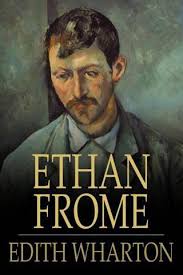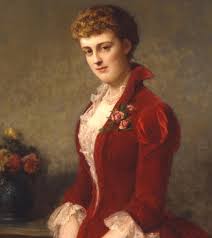Ethan Frome Page #26
Ethan Frome is a 1911 book by American author Edith Wharton. It is set in the fictitious town of Starkfield, Massachusetts. The novel was adapted into a film, Ethan Frome, in 1993.
“Get up,” he ordered her. It was the tone she always heeded, but she cowered down in her seat, repeating vehemently: “No, no, no!” “Get up!” “Why?” “I want to sit in front.” “No, no! How can you steer in front?” “I don't have to. We'll follow the track.” They spoke in smothered whispers, as though the night were listening. “Get up! Get up!” he urged her; but she kept on repeating: “Why do you want to sit in front?” “Because I--because I want to feel you holding me,” he stammered, and dragged her to her feet. The answer seemed to satisfy her, or else she yielded to the power of his voice. He bent down, feeling in the obscurity for the glassy slide worn by preceding coasters, and placed the runners carefully between its edges. She waited while he seated himself with crossed legs in the front of the sled; then she crouched quickly down at his back and clasped her arms about him. Her breath in his neck set him shuddering again, and he almost sprang from his seat. But in a flash he remembered the alternative. She was right: this was better than parting. He leaned back and drew her mouth to his... Just as they started he heard the sorrel's whinny again, and the familiar wistful call, and all the confused images it brought with it, went with him down the first reach of the road. Half-way down there was a sudden drop, then a rise, and after that another long delirious descent. As they took wing for this it seemed to him that they were flying indeed, flying far up into the cloudy night, with Starkfield immeasurably below them, falling away like a speck in space... Then the big elm shot up ahead, lying in wait for them at the bend of the road, and he said between his teeth: “We can fetch it; I know we can fetch it--” As they flew toward the tree Mattie pressed her arms tighter, and her blood seemed to be in his veins. Once or twice the sled swerved a little under them. He slanted his body to keep it headed for the elm, repeating to himself again and again: “I know we can fetch it”; and little phrases she had spoken ran through his head and danced before him on the air. The big tree loomed bigger and closer, and as they bore down on it he thought: “It's waiting for us: it seems to know.” But suddenly his wife's face, with twisted monstrous lineaments, thrust itself between him and his goal, and he made an instinctive movement to brush it aside. The sled swerved in response, but he righted it again, kept it straight, and drove down on the black projecting mass. There was a last instant when the air shot past him like millions of fiery wires; and then the elm... The sky was still thick, but looking straight up he saw a single star, and tried vaguely to reckon whether it were Sirius, or--or--The effort tired him too much, and he closed his heavy lids and thought that he would sleep... The stillness was so profound that he heard a little animal twittering somewhere near by under the snow. It made a small frightened cheep like a field mouse, and he wondered languidly if it were hurt. Then he understood that it must be in pain: pain so excruciating that he seemed, mysteriously, to feel it shooting through his own body. He tried in vain to roll over in the direction of the sound, and stretched his left arm out across the snow. And now it was as though he felt rather than heard the twittering; it seemed to be under his palm, which rested on something soft and springy. The thought of the animal's suffering was intolerable to him and he struggled to raise himself, and could not because a rock, or some huge mass, seemed to be lying on him. But he continued to finger about cautiously with his left hand, thinking he might get hold of the little creature and help it; and all at once he knew that the soft thing he had touched was Mattie's hair and that his hand was on her face. He dragged himself to his knees, the monstrous load on him moving with him as he moved, and his hand went over and over her face, and he felt that the twittering came from her lips... He got his face down close to hers, with his ear to her mouth, and in the darkness he saw her eyes open and heard her say his name. “Oh, Matt, I thought we'd fetched it,” he moaned; and far off, up the hill, he heard the sorrel whinny, and thought: “I ought to be getting him his feed...” ***** THE QUERULOUS DRONE ceased as I entered Frome's kitchen, and of the two women sitting there I could not tell which had been the speaker. One of them, on my appearing, raised her tall bony figure from her seat, not as if to welcome me--for she threw me no more than a brief glance of surprise--but simply to set about preparing the meal which Frome's absence had delayed. A slatternly calico wrapper hung from her shoulders and the wisps of her thin grey hair were drawn away from a high forehead and fastened at the back by a broken comb. She had pale opaque eyes which revealed nothing and reflected nothing, and her narrow lips were of the same sallow colour as her face. The other woman was much smaller and slighter. She sat huddled in an arm-chair near the stove, and when I came in she turned her head quickly toward me, without the least corresponding movement of her body. Her hair was as grey as her companion's, her face as bloodless and shrivelled, but amber-tinted, with swarthy shadows sharpening the nose and hollowing the temples. Under her shapeless dress her body kept its limp immobility, and her dark eyes had the bright witch-like stare that disease of the spine sometimes gives. Even for that part of the country the kitchen was a poor-looking place. With the exception of the dark-eyed woman's chair, which looked like a soiled relic of luxury bought at a country auction, the furniture was of the roughest kind. Three coarse china plates and a broken-nosed milk-jug had been set on a greasy table scored with knife-cuts, and a couple of straw-bottomed chairs and a kitchen dresser of unpainted pine stood meagrely against the plaster walls. “My, it's cold here! The fire must be 'most out,” Frome said, glancing about him apologetically as he followed me in. The tall woman, who had moved away from us toward the dresser, took no notice; but the other, from her cushioned niche, answered complainingly, in a high thin voice. “It's on'y just been made up this very minute. Zeena fell asleep and slep' ever so long, and I thought I'd be frozen stiff before I could wake her up and get her to 'tend to it.” I knew then that it was she who had been speaking when we entered. Her companion, who was just coming back to the table with the remains of a cold mince-pie in a battered pie-dish, set down her unappetising burden without appearing to hear the accusation brought against her. Frome stood hesitatingly before her as she advanced; then he looked at me and said: “This is my wife, Mis' Frome.” After another interval he added, turning toward the figure in the arm-chair: “And this is Miss Mattie Silver...” ***** Mrs. Hale, tender soul, had pictured me as lost in the Flats and buried under a snow-drift; and so lively was her satisfaction on seeing me safely restored to her the next morning that I felt my peril had caused me to advance several degrees in her favour.
Translation
Translate and read this book in other languages:
Select another language:
- - Select -
- 简体中文 (Chinese - Simplified)
- 繁體中文 (Chinese - Traditional)
- Español (Spanish)
- Esperanto (Esperanto)
- 日本語 (Japanese)
- Português (Portuguese)
- Deutsch (German)
- العربية (Arabic)
- Français (French)
- Русский (Russian)
- ಕನ್ನಡ (Kannada)
- 한국어 (Korean)
- עברית (Hebrew)
- Gaeilge (Irish)
- Українська (Ukrainian)
- اردو (Urdu)
- Magyar (Hungarian)
- मानक हिन्दी (Hindi)
- Indonesia (Indonesian)
- Italiano (Italian)
- தமிழ் (Tamil)
- Türkçe (Turkish)
- తెలుగు (Telugu)
- ภาษาไทย (Thai)
- Tiếng Việt (Vietnamese)
- Čeština (Czech)
- Polski (Polish)
- Bahasa Indonesia (Indonesian)
- Românește (Romanian)
- Nederlands (Dutch)
- Ελληνικά (Greek)
- Latinum (Latin)
- Svenska (Swedish)
- Dansk (Danish)
- Suomi (Finnish)
- فارسی (Persian)
- ייִדיש (Yiddish)
- հայերեն (Armenian)
- Norsk (Norwegian)
- English (English)
Citation
Use the citation below to add this book to your bibliography:
Style:MLAChicagoAPA
"Ethan Frome Books." Literature.com. STANDS4 LLC, 2025. Web. 26 Feb. 2025. <https://www.literature.com/book/ethan_frome_264>.








Discuss this Ethan Frome book with the community:
Report Comment
We're doing our best to make sure our content is useful, accurate and safe.
If by any chance you spot an inappropriate comment while navigating through our website please use this form to let us know, and we'll take care of it shortly.
Attachment
You need to be logged in to favorite.
Log In